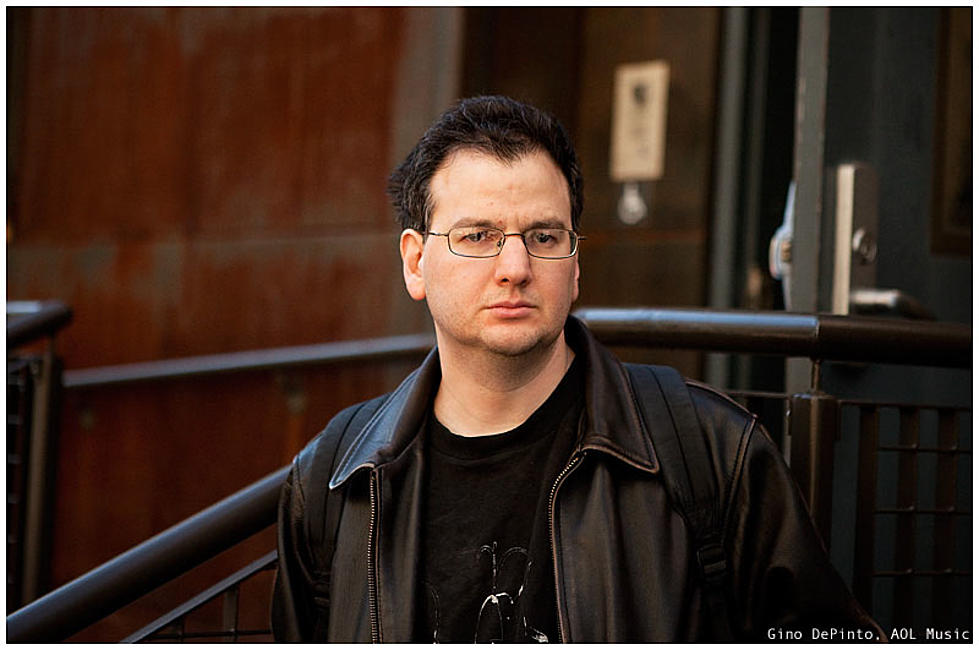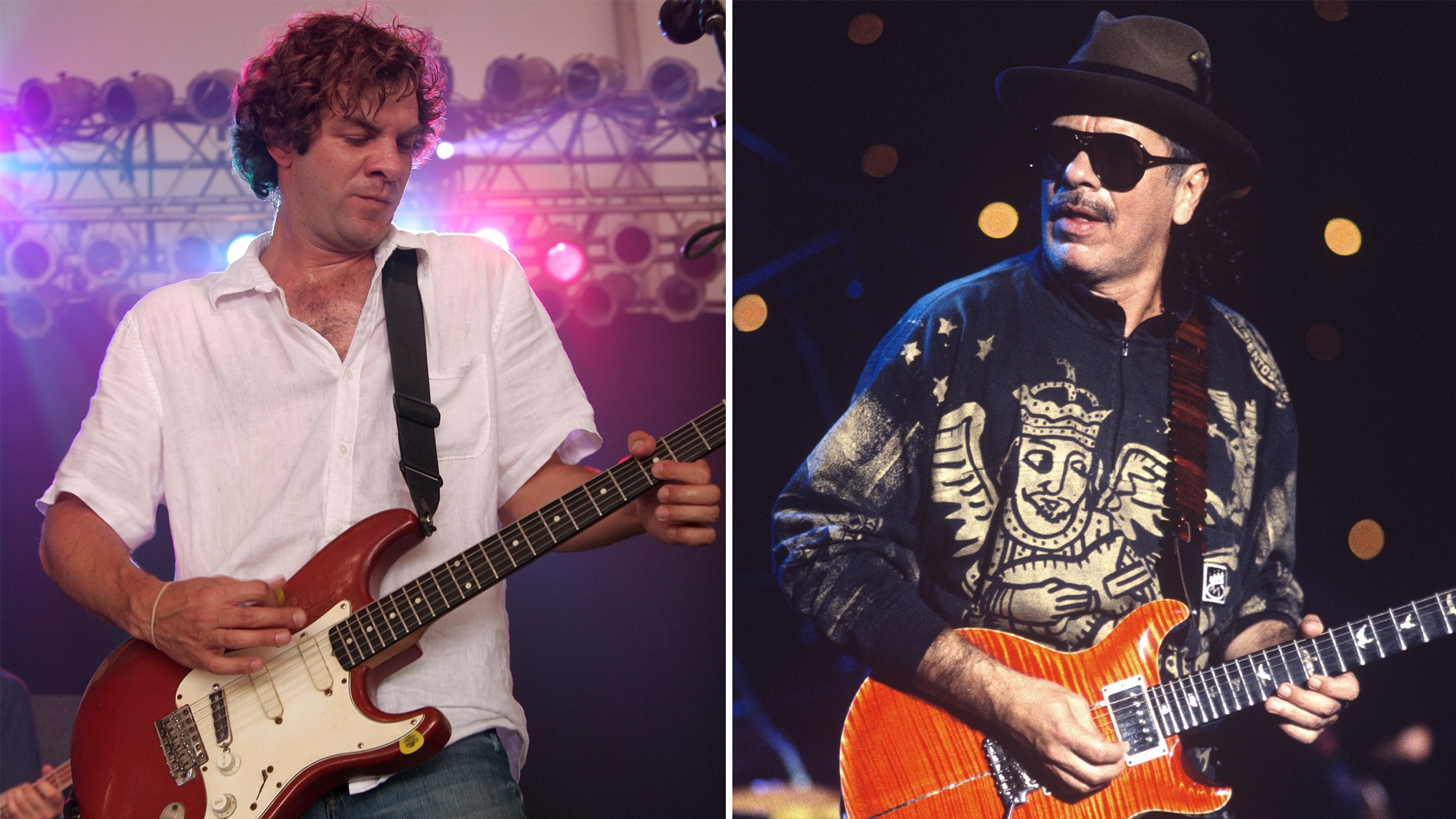How to tell Jim Root and Mick Thomson’s Slipknot guitar parts apart
The Iowa bruise brothers of metal address the guitar with contrasting styles, but as they explain here, they know what the other is about to do before they do themselves

All the latest guitar news, interviews, lessons, reviews, deals and more, direct to your inbox!
You are now subscribed
Your newsletter sign-up was successful
On album and onstage, Slipknot guitarists Jim Root and Mick Thomson work together as a team. Both play rhythm and lead tracks, and both feed off the energy and excitement of the other’s musicianship. They also equally enjoy a dizzying variety of textural passages and rib-kicking riffs.
So, amid the firestorm of barrelling beats, pummelling percussion, screeching samples, DJ scratching and vocal acrobatics, how can you tell if a guitar part you’re hearing is coming from Root or Thomson?
The easiest way is to pay attention to which direction the sound is coming from (this is easily accomplished with headphones). Root’s parts are always in the left part of the stereo mix and Thomson’s are always on the right. The same goes for their live shows.
But what if the listener is cranking the band’s tunes on a mono Bluetooth speaker? Well, there are other ways to tell the differences between the two players.
“We’re really different kinds of players, but we complement each other really well,” Thomson says. “What isn’t in my wheelhouse is in Jim’s. He’s more of a rock guy and I’m more of a technical metal player. He’s got a great touch and plays legato, and I play some of the more offbeat stuff.”
Can you describe your working relationship?
Thomson: “When you play with somebody for long enough, you develop a seventh sense. Me and Jim know each other well enough that without thinking about it consciously, he automatically adapts to playing along with whatever I’m doing. I guarantee he can anticipate when a note’s gonna come out of me, just as I can with him.”
All the latest guitar news, interviews, lessons, reviews, deals and more, direct to your inbox!
What should listeners keep an ear out for to tell the two of you apart?
Root: “I’m a liquid sort of organic guy and he’s more like, ‘Here I am. I’m gonna lay it down and it’s in your fucking face and it’s gonna be powerful.’ I like to mix alternate picking with legato and I’m a little bit more fluid than Mick. But Mick understands theory and tries to put it in place a lot more than I do. I’m more of an instinct player. Even if I play something out of key, I don’t care because sometimes that shit works and creates something you wouldn’t normally get.”
There’s a push-pull dynamic to Slipknot’s guitar parts.
Thomson: “I tend to rush stuff a little bit. I can be really on top of shit and pushing it, and he’ll lay back a little bit more. I have a more staccato, shorter, barky guitar attack and Jim’s got a fatter, raw tone.
“His playing is a bit looser and mine’s more tight. If we both played the same guitar, I think his chug would be a little bigger and fatter just from the way he holds his pick. And it’s funny ’cause he plays with a lot more gain than I do.”
Did you pre-write the leads for The End, So Far?
Root: “I have different phases of guitar playing that I go through. There’s the woodshedding phase where your muscle memory’s really great around the fretboard. And then you have your writing mode. For me, that’s when I throw all the woodshedding and muscle memory out the window and focus on the songs and the riffs. And that’s the phase I was in when we were recording.
“I’m kind of bummed because I was really out of practice when we tracked the record. I was insecure about playing the guitar and doing the solos. I was just like, ‘Shit, why now?’ If we had time, I’d like to go back and reapproach some of the solos.”
Thomson: “We didn’t write any of the solos. What you hear on the record is what came out when I had a guitar in my hand and Joe said, ‘Okay, go.’ It wasn’t a big, epic thing. If there were any bigger, more involved leads, I probably would have sat down, felt it out, built it and taken it someplace instead of recording a bunch of random, sporadic shit that came out of my brain once that afternoon and now has to stand the test of time.”
It sounds like there’s more whammy bar playing in the solos. Which one of you brought that to the album?
Thomson: “That was me. I bought a couple of Jackson Dinky guitars with whammies on Reverb.com and brought them into the studio. I even got a fucking Jackson sustainer, so I went nuts with the wang bar on a bunch of spots ’cause I was having fun. I’ve only played hardtails ever since we started recording. I literally drove to Simi Valley to pick up these guitars and then used them to record my solos.”
- The End, So Far is out now via Roadrunner.
Jon is an author, journalist, and podcaster who recently wrote and hosted the first 12-episode season of the acclaimed Backstaged: The Devil in Metal, an exclusive from Diversion Podcasts/iHeart. He is also the primary author of the popular Louder Than Hell: The Definitive Oral History of Metal and the sole author of Raising Hell: Backstage Tales From the Lives of Metal Legends. In addition, he co-wrote I'm the Man: The Story of That Guy From Anthrax (with Scott Ian), Ministry: The Lost Gospels According to Al Jourgensen (with Al Jourgensen), and My Riot: Agnostic Front, Grit, Guts & Glory (with Roger Miret). Wiederhorn has worked on staff as an associate editor for Rolling Stone, Executive Editor of Guitar Magazine, and senior writer for MTV News. His work has also appeared in Spin, Entertainment Weekly, Yahoo.com, Revolver, Inked, Loudwire.com and other publications and websites.

![Slipknot - Yen [OFFICIAL VIDEO] - YouTube](https://img.youtube.com/vi/9FnG9lGLyEM/maxresdefault.jpg)


